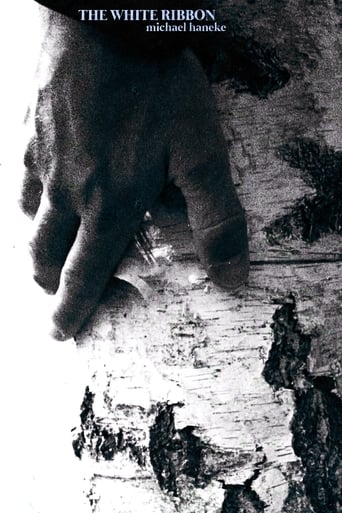

Might be a good movie if they cut out at least one hour but they didnt.
... View MoreThe White Ribbon (German: Das weiße Band, Eine deutsche Kindergeschichte) (2009) Haneke shows us, with effective black and white, how iniquitous everyday life can be, the children perhaps the worst. (Tanka (tan-kah) poems are short poems that are five lines long, with the 5-7-5-7-7 syllable format. #Tanka #PoemReview
... View MoreIt will take me a long time to get this film out of my brain. We are brought into a community where a baron runs things, almost the entire village affected by his whims. He lives with his young wife and children. She hates it there and the kids are accepted grudgingly by their peers. In the village are a harsh Protestant minister, a schoolteacher, a doctor, and other figures of fierce authority, plus quite a group of children who have lived in oppressive conditions. We are mad privy to the humorless village where no one smiles and where common people live in fear of the future. Religion is presented as a venomous and ugly thing. The minister's children are routinely beaten and humiliated for their "sins" including an awful diatribe on the results of masturbation (sores, mental illness, and death). The boy is forced to sleep with his hands tied to the sides of the bed. It becomes likely that all this oppression is going to ultimately lead to some pretty bad results. Visually, this film is striking in its utter blackness.
... View MoreMichael Haneke is one of those directors who deliver tough love. There's no pampering of viewers with too obvious plots, shallow characters or corny humor. "Das Weisse Band" is a great example of this. Set in a pre-WW1 German village, it's a story about a series of disturbing, seemingly inexplicable events that shake the pious protestant community to its core. Basically, what Haneke does here is a biopsy of the roots of fascism in the human character and its slow but steady community cultivation that may, or may not, explode at a certain point in the future. This is achieved with an immensely subtle approach: there's no mention of Nazis or fascism itself; the narrator of the story itself just says at the beginning that he will try to "explain some things that happened later" and we're left puzzled until it dawns on us what he actually referred to. In a way, the film is structured with symbols similar to those from Georg Grosz's art, with the main protagonists being referred to only by their function, instead of their name (Priest, Teacher, Baron etc.), which is aimed at showing that this could happen-and has happened- everywhere. The cinematography is remarkably done in b/w and the haunting motif of the white ribbons on the kids' arms seem like a dark premonition of the yellow stars from WW2. The end comes as puzzling as the rest, there's no solution, nor absolution. The world is slowly descending into darkness, and everyone pretends they don't see it. What's more, it seems that we're in a similar situation today, with barbed wires in place of white ribbons. And yet, we didn't learn anything from Haneke, or an another man who showed us the sheer size of unleashed evil, and whose name starts with the same letter. Hitler.
... View More